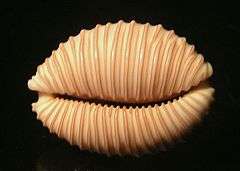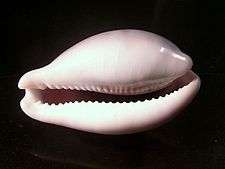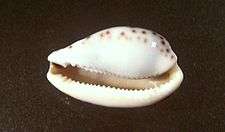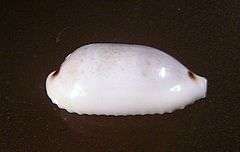Cypraeidae
| Cypraeidae | |
|---|---|
.jpg) | |
| A live Talparia talpa in situ with its mantle almost fully extended, anterior end towards the right | |
 | |
| Shells of a number of species of cowries | |
| Scientific classification | |
| Kingdom: | Animalia |
| Phylum: | Mollusca |
| Class: | Gastropoda |
| (unranked): | clade Caenogastropoda clade Hypsogastropoda |
| Superfamily: | Cypraeoidea |
| Family: | Cypraeidae Rafinesque, 1815 |
| Genera | |
|
See list | |
Cypraeidae, common name the cowries (singular: cowry), is a taxonomic family of small to large sea snails. These are marine gastropod mollusks in the superfamily Cypraeoidea, the cowries and cowry allies.
Shell description
Cypraeidae have adult shells which are very rounded, almost like an egg; they do not look like a typical gastropod shell. In virtually all of the species in the family Cypraeidae, the shells are extremely smooth and shiny. This is because in the living animal, the shell is nearly always fully covered with the mantle.
Typically, no spire is visible in the fully adult shell, and there is a long, narrow, aperture which is lined with "teeth."
Juvenile cowry shells are not at all similar to adult cowry shells. The juvenile shells of cowries perhaps more closely resemble the shells of some "bubble snails" in the order Cephalaspidea. Also the shells of juvenile cowries seldom exhibit the same color patterns as the adult shells do, and thus can be hard to identify to species.
Cowries have no operculum.
Predators and prey
The very narrow toothed aperture of the cowry shell makes the adult shells difficult for many predators to reach into. However cowries are still vulnerable to predation:[1]
- Some tropical crustaceans can break the dorsum of a cowry shell.
- Some mollusc-eating cones, such as Conus textile, can inject venom into the cowry's flesh. The cone then extends its stomach into the shell, through the aperature, to completely ingest the flesh.
- Some octopuses can gouge a small hole (using a special barb/tooth and an acidic secretion) through the shell to inject a venom that kills the animal within.
The eating habits of cowries are poorly known, because most species are nocturnal and cryptic, but sponges are the most commonly described prey. Off the coasts of Australia, common cowry species eat sponges,[1] and on Caribbean coral reefs they are known to eat sponges that are otherwise chemically defended against other predators.[2]
Taxonomy
For nearly 200 years, every species in the family Cypraeidae was placed in one genus, Cypraea, but in 2002 [3] the cowries were divided into many different genera.
2005 taxonomy
The family Cypraeidae belongs, together with the family Ovulidae, to the superfamily Cypraeoidea. This, in turn, is part of the clade Littorinimorpha which belongs within the clade Hypsogastropoda according to the taxonomy of Bouchet & Rocroi (2005).
The following six subfamilies have been recognized in the taxonomy of Bouchet & Rocroi (2005) but are treated as alternate representation of Cypraeidae in the World Register of Marine Species :
- Cypraeinae Rafinesque, 1815
- tribe Cypraeini Rafinesque, 1815 - synonym: Porcellanidae Roberts, 1870 (inv.)
- tribe Mauritiini Steadman & Cotton, 1946
- Erosariinae Schilder, 1924 - synonyms: Cypraeacitinae Schilder, 1930 (inv.); Nariinae Schilder, 1932; Staphylaeinae iredale, 1935
- Erroneinae Schilder, 1927
- tribe Erroneini Schilder, 1927 - synonym: Adustinae Steadman & Cotton, 1946
- tribe Bistolidini C. Meyer, 2003
- Gisortiinae Schilder, 1927 - synonyms: Archicypraeinae Schilder, 1930; Bernayinae Schilder, 1927; Cpraeorbini Schilder, 1927; Mandolininae Schilder, 1932; Umbiliini Schilder 1932; Zoilinae Iredale, 1935
- Luriinae Schilder, 1932
- tribe Luriini Schilder, 1932 - synonym: Talpariinae Iredale, 1935
- tribe Austrocypraeini Iredale, 1935
- Pustulariinae Gill, 1871
- tribe Pustulariini Gill, 1871
- tribe Cypraeovulini Schilder, 1927
- tribe Zonariini Schilder, 1932
Genera
Genera within the family Cypraeidae include:
- Subfamily Cypraeinae Rafinesque, 1815
- Leporicypraea Iredale, 1930
- Tribe Cypraeini
- Tribe Mauritiini Steadman & Cotton, 1946
- Macrocypraea
- Mauritia Troschel, 1863
- Subfamily Erosariinae Schilder, 1924 - The taxonomy of Bouchet & Rocroi does not mention any tribes in this subfamily.

- Nucleolaria Oyama, 1959
- Tribe Staphylaeini
- Cryptocypraea Meyer, 2003[4]
- Perisserosa [4]
- Staphylaea Jousseaume, 1884
- Tribe Erosariini
- Subfamily Erroneinae Schilder, 1927
- Tribe Erroneini Schilder, 1927
- Austrasiatica Lorenz, 1989
- Blasicrura Iredale, 1930
- Contradusta Meyer, 2003
- Eclogavena[4]
- Erronea Troschel, 1863
- Ficadusta Habe & Kosuge 1966
- Palmulacypraea Meyer, 2003[4]
- Purpuradusta Schilder, 1939
- Talostolida Iredale, 1931
- Tribe Bistolidini C. Meyer, 2003[4]
- Bistolida Cossmann, 1920
- Cribrarula Strand, 1929
- Palmadusta Iredale, 1930
- Tribe Erroneini Schilder, 1927
- Subfamily Gisortiinae Schilder, 1927
- † Afrocypraea Schilder, 1932
- Archicypraea Schilder, 1926
- Barycypraea Schilder, 1927
- Bernaya Jousseaume, 1884
- Gisortia Jousseaume 1884
- Ipsa Jousseaume, 1884
- † Mandolina Jousseaume 1884
- Nesiocypraea Azuma & Kurohara, 1967
- Palaeocypraea Schilder, 1928
- Proadusta Sacco 1894
- Umbilia Jousseaume, 1884
- Vicetia Fabiani 1905
- Zoila Jousseaume, 1884
- Subfamily Luriinae Schilder, 1932
- Tribe Luriini Schilder, 1932
- Tribe Austrocypraeini Iredale, 1935
- Annepona Iredale, 1935
- Arestorides Iredale 1930
- Austrocypraea Cossmann, 1903
- Chelycypraea Schilder, 1927
- Lyncina Troschel, 1863
- † Miolyncina
- Trona Jousseaume, 1884
- Subfamily Pustulariinae Gill, 1871
- Tribe Pustulariini Gill, 1871


- Pustularia Swainson, 1840
- Tribe Cypraeovulini Schilder, 1927
- Chimaeria Briano, 1993
- Cypraeovula Gray, 1824
- Notadusta Schilder, 1935
- Notocypraea Schilder, 1927
- † Notoluponia Schilder 1935
- Tribe Pseudozonariini
- Neobernaya Schilder 1927
- Pseudozonaria Schilder, 1929
- Tribe Zonariini Schilder, 1932
- Schilderia Tomlin, 1930
- Zonaria Jousseaume, 1884
- † Zonarina Sacco, 1894

- subfamily ?
- Contradusta Meyer, 2003[4]
- Melicerona Iredale, 1930
- Muracypraea Woodring, 1957
- Ovatipsa Iredale, 1931
- Propustularia Schilder, 1927
- Ransoniella Dolin & Lozouet, 2005
- Nomen nudum
- Cupinota Iredale, 1939 [5]
Species
For a list of Species in the taxonomic family Cypraeidae, see Cowries.
References
- 1 2 Wilson, Barry; Clarkson, Peter (2004). Australia's Spectacular Cowries. El Cajon, CA, USA: Odyssey. ISBN 0966172027.
- ↑ Pawlik, JR; Deignan, Lindsey (2015). "Cowries graze verongid sponges on Caribbean reefs". Coral Reefs. 34: 663. doi:10.1007/s00338-015-1279-x.
- ↑ Lorenz F. 2002. New Worldwide Cowries. Descriptions of new taxa and revisions of selected groups of living Cypraeidae (Mollusca: Gastropoda). Schriften zur Malakozoologie aus dem Haus der Natur-Cismar 20: 1-292, pl. 1-40
- 1 2 3 4 5 6 Meyer C. P. (2003) "Molecular systematics of cowries (Gastropoda: Cypraeidae) and diversification patterns in the tropics". Biological Journal of the Linnean Society 79(3): 401–459. doi:10.1046/j.1095-8312.2003.00197.x
- ↑ Bouchet, P.; Gofas, S. (2016). Cupinota Iredale, 1939. In: MolluscaBase (2016). Accessed through: World Register of Marine Species at http://www.marinespecies.org/aphia.php?p=taxdetails&id=742093 on 2016-10-25
Further reading
- Meyer, Christopher P. (2004). "Toward Comprehensiveness : Increased molecular sampling within Cypraeidae and its phylogenetic implications" (PDF). Malacologia. 46 (1): 127–156. Retrieved 2010-10-10.
- Felix Lorenz and Alex Hubert : A Guide to Worldwide Cowries, second revised edition, Conch Books, 2002 ISBN 3-925919-25-2
External links
| Wikimedia Commons has media related to Cypraeidae. |
| Wikispecies has information related to: Cypraeidae |